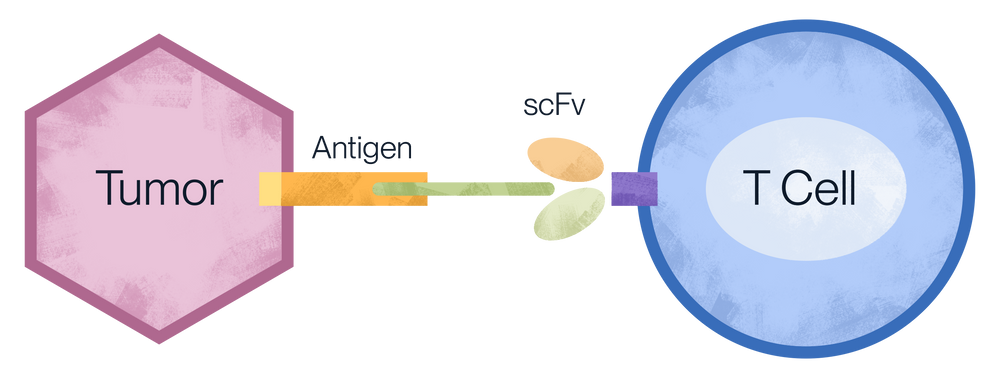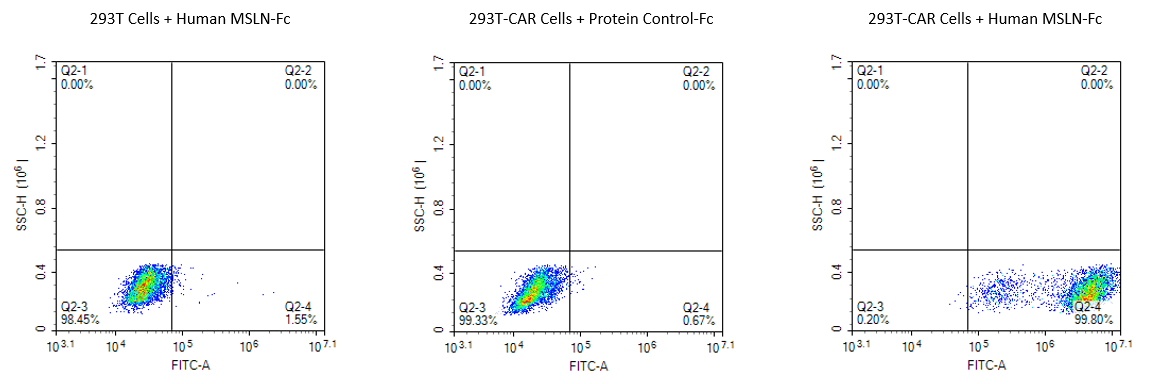Background
Chimeric Antigen Receptor T-Cell Immunotherapy (CAR-T) is a novel immunotherapy that has achieved success in the treatment of various hematological malignancies.
The concept behind CAR-T therapy is to empower the immune system to attack cancer cells. In short, a patient's T cells are isolated and genetically engineered to express a chimeric antigen receptor (CAR), which recognizes specific tumor-associated antigens, such as CD19, a cell surface protein highly expressed on malignant B cells. Upon recognizing the antigen on tumor cells, CAR-T cells initiate a series of immune responses to kill the tumor cells. With an increasing number of CAR-T drugs being approved for marketing (such as Kymriah and Yescarta), CAR-T cell therapy has entered a period of rapid development, demonstrating immense potential.

CAR-T cell binding tumors mechanism.
Comprehensive Catalog of CAR-T Target Proteins
Leveraging our unique SAMS™ protein engineering and expression platform, KACTUS has developed a series of high-quality CAR-T target protein products, covering a wide range of popular targets such as CD19, BCMA, and MSLN. We also offer various modifications including site-specific labeling, fluorescent labeling, and biotinylation, flexibly meeting diverse research and development needs such as CAR-T affinity assays. If you don't see what you're looking for in our catalog, you can always request a custom protein.
Product Features
→ HEK293 Expression
→ His-Avi, hFc, mFc, His, hFc-Avi, etc. protein tags
→ Bioactivity verified (ELISA & SPR)
→ High Purity
→ Human, Mouse, Cynomolgus, Rhesus Macaque, Rat
→ Biotinylated Proteins
Product Applications
→ CAR-T immunity studies
→ Antibody screening (such as scFv, single domain antibody, etc.)
→ CAR-T affinity studies
Featured CAR-T Targets
Product Validation Data
KACTUS offers a wide range of fluorescent-labeled target proteins that streamline CAR detection by eliminating the need for secondary antibodies, reducing background staining, and increasing efficiency. Our portfolio includes popular target antigens relevant to current CAR-T research, all with high bioactivity, uniformity, and batch-to-batch consistency.
Leveraging our advanced protein expression platform, KACTUS also provides a comprehensive solution for protein customization. We offer various modifications such as site-specific labeling, fluorescent labeling (FITC, PE, APC, and others), and biotinylation, to meet various research requirements such as CAR-T affinity testing.
FITC-Compatible Human CD19

FACS data demonstrating that 100 µl of FITC-Compatible Human CD19 (His Tag) (10 µg/ml) can specifically bind to 1×106 Anti-CD19 CAR T cells, resulting in a positive detection rate greater than 96%. FITC-labeled irrelevant protein (100 µl, 10 µg/ml) was used as a negative control.
PE-Labeled Human EGFRVIII

FACS analysis of Anti-EGFRVIII CAR Expression. 293T cells were transfected with anti-EGFRVIII-scFv and His tag. Cells were incubated with 5 µg/ml PE-Labeled Human EGFRVIII (His-Avi Tag) and PE-labeled protein control. Non-transfected 293T cells and PE-labeled protein control were used as negative controls. The PE-labeled Human EGFR VIII specifically binds to Anti-EGFR VIII-CAR T cells, with a positive detection rate of over 99%.
Biotinylated Human MSLN/Mesothelin

FACS analysis of Anti-MSLN-CAR expression. 293T cells were transfected with anti-MSLN-scFv and Fc tag. These cells were stained with 5 µg/ml FITC-Labeled Human MSLN (296-580), Fc Tag, and a FITC-labeled protein control. Non-transfected 293T cells and FITC-labeled protein control were used as negative controls. FITC-labeled SA was used to confirm that Biotinylated Human MSLN (hFc-Avi Tag) can specifically bind to Anti-MSLN-CAR 293T cells, resulting in a positive rate greater than 99%.
Available Products

Customize your protein

About KACTUS

SAMS™ Technology Platform

Quality Control
CAR-T Target Proteins FAQs
CAR-T target proteins are tumor-associated antigens used to evaluate the specificity and function of CAR-T cells. These proteins are essential for testing how well CAR-T constructs recognize and bind to cancer cells.
KACTUS offers a broad selection of targets including CD19, BCMA, EGFR, MSLN, PSMA, GPC3, CD70, and others. These proteins support research in both blood cancers and solid tumors.
Yes. All CAR-T targets undergo rigorous QC using ELISA and SPR assays. Select targets are also validated in CAR-T cell binding assays to confirm biological activity and target specificity.
Yes. Many targets are available in fluorescent-labeled formats such as FITC and PE, which are ideal for flow cytometry (FACS). These ready-to-use labels eliminate the need for secondary antibodies, streamlining workflows.
Available tags include His, His-Avi, hFc, mFc, hFc-Avi, and biotinylated options. These support a wide range of techniques such as ELISA, SPR, affinity assays, and cell-based screening.
Yes. KACTUS provides species-specific CAR-T targets for human, mouse, cynomolgus macaque, rhesus macaque, and rat. These options support cross-species compatibility in preclinical studies.
CAR-T target proteins are used in:
– CAR-T binding and affinity assays
– Flow cytometry (FACS)
– Antibody screening
– Target validation and immune profiling
– Preclinical therapeutic development
Yes. KACTUS offers custom protein production services, including tag modification, labeling (e.g., biotin, fluorophores), and bulk manufacturing. Just contact our technical team to submit your request.
KACTUS uses its proprietary SAMS™ protein engineering platform to deliver CAR-T targets with high purity, bioactivity validation, and batch-to-batch consistency. These attributes make them ideal for precision-driven, high-throughput immunotherapy research.
Related Products & Information
CAR-T Products & Services
Gene Editing Enzymes





